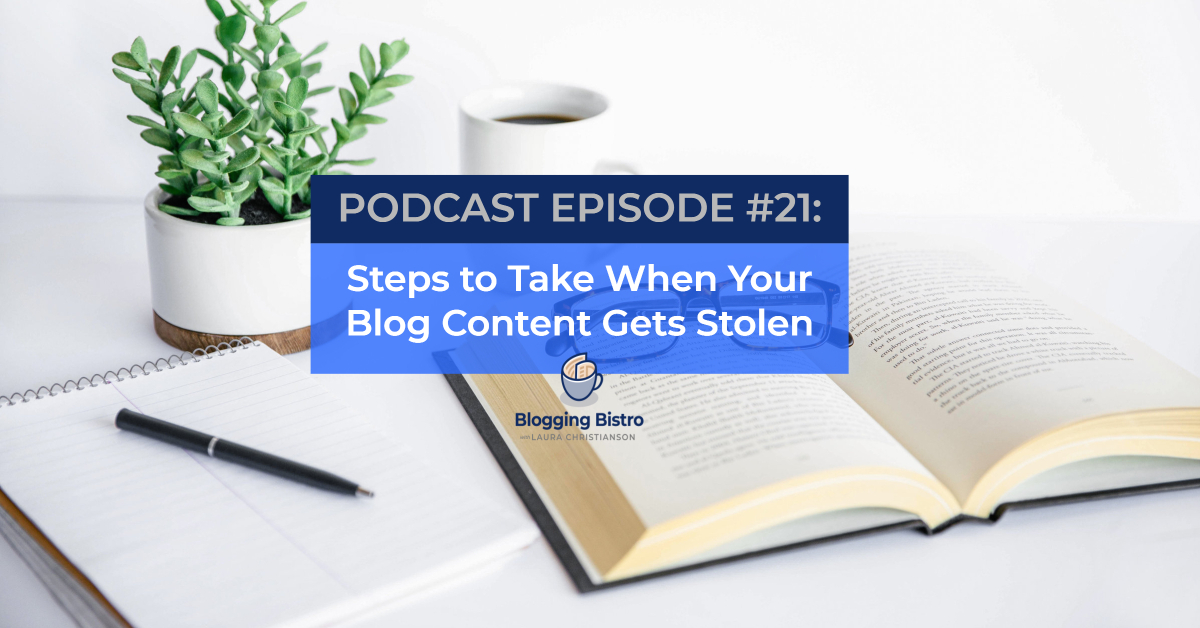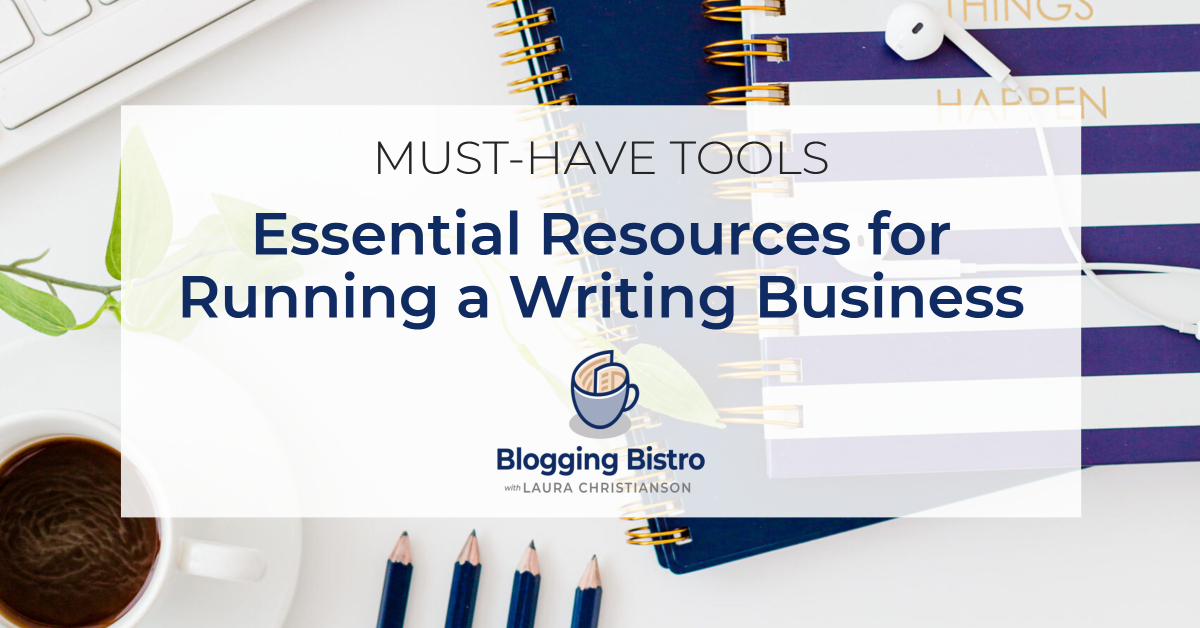21 – Steps to Take When Your Blog Content Gets Stolen (And How to Legally Share Others’ Content)

Has someone ever copied an entire blog post you’ve written and pasted it on their own blog?
That has happened to me several times, and it also happened to Tim Fall, last week’s guest on The Professional Writer podcast.
The issue of copying and pasting other people’s content has a lot of misconceptions swirling around it. I want to address the faulty reasoning used by people who do this, and provide guidelines to follow.
We’re going to look at this issue from two perspectives:
- You’re a blogger whose content has been reproduced without your permission. What action should you take?
- You’re a blogger who discovers a great blog post and thinks, “I want to share this with my own readers.” What’s the appropriate and legal way to share someone else’s content?
Let’s start by looking at what happened to Tim Fall. Tim, who’s a memoir author and avid blogger and social media user, wrote on Facebook that a man copied his entire post and put it on his blog. Not just a couple of lines, but the whole post. The man put a link back to Tim’s post at the end.
How would you react if someone did this with a post that you’d labored long and hard to write and polish?
Here’s what Tim did: He asked the other blogger “not to appropriate the whole post without permission.”
The blogger replied, “It’s all right since we’re both Christians.” Then he added, besides, I attributed it to you.
Tim insisted that this was not okay and asked the blogger to remove the post.
The blogger acted affronted.
Tim has had this happen more than once. He wrote,
“One guy went so far as to tell me that everything on the Internet is public domain so he had every right to use it without my permission. I kept insisting anyway. He finally deleted it and then posted a special note on his blog telling followers that I was being unreasonable and that’s why he had to take down the post he copied from my blog.”
As I was reading Tim’s Facebook post, my blood started to boil.
Apparently, lots of other people’s blood pressure was skyrocketing, too, because his post received over 100 comments. Some people laughed it off with an “oh, well; what can you expect from the Internet” attitude.
Others wondered where this guy was from, and suggested that his actions might be due to cultural differences.
Several people asked for clarification:
Did the guy share Tim’s post? In other words, did he click a “Share” button like you would do on a Facebook post?
No. When you click a “share” button on a blog post, it doesn’t copy the entire post; it copies the title, possibly a short description or excerpt, and the link to the post, which is intended to be shared on social media. This guy manually copied and pasted Tim’s entire post as a new post on his own blog.
Did he use quotation marks and attribute the content to Tim? Unsure about the quotation marks, but he put a link to Tim’s blog at the bottom of what Tim calls “the pilfered post.”
One person suggested that Tim copyright his blog using a Creative Commons License and that might stop some of the blatant plagiarism.
That advice, while well-intended, was inaccurate on three levels:
First, Tim doesn’t need to put a © symbol or copyright notice on his blog or on any of the posts his writes that are published on his blog. Tim doesn’t need to register a copyright with some government agency. His blog and all the published posts on his blog that Tim wrote are instantaneously protected by U.S. copyright laws upon publication. (See Natalie Mootz’s article, “Blogging & Copyright Law in 2020”)
Intellectual property that you create, such as a blog post, is automatically copyrighted.
Second, a Creative Commons License is just that – a license to use content as-is or as part of a new work. But Tim would still own the copyright to his work and the person using that work would need to follow the specifications Tim outlined in the license.
Third, copying and pasting someone else’s post onto your own blog is not plagiarism.
Word Nerd Moment
Plagiarism is when you pass someone else’s work off as your own. If you copied and pasted Tim’s entire blog post and put your own byline on the post, as if you wrote it, that is plagiarism.
What happened to Tim is called copyright infringement.
And yes, the correct spelling is copyright (not copywrite).
An easy way to remember the correct spelling:
copyright means the right to copy.
A couple of Tim’s commenter’s didn’t see the harm in “quoting” Tim or doing what they called “reposting” or generous “sharing” – in other words, copying word-for-word his entire 1,200-word article – because the blogger who pirated Tim’s work gave Tim credit.
Tim replied, “They can’t do it even if they do give credit. I wrote a blog post, he copied the whole thing and put it on his blog, and then added a link at the bottom back to my page. He stole my work.”
That’s the bottom line. The blogger stole Tim’s work – infringed on Tim’s copyright – and couched his misdeed by “playing the ‘God card’ to justify his unethical and illegal behavior – we’re both Christians, so you should be fine with me stealing your writing.
Tim was not flattered that this man was so impressed with Tim’s stellar writing that he appropriated the entire article for himself. My guess is that Tim was irritated.
What can you do when someone infringes on your copyrighted content?
Disclaimer: This is not legal advice. I am offering practical suggestions based on my own experiences and research.
A situation similar to Tim’s happened to me. In my case, it was clear-cut plagiarism because the blogger reprinted my entire article AND put their own name, as the author, directly above my article. The plagiarizer did not link the article back to my blog.
I took immediate action, posting the following comment on her blog, beneath my article:
Please delete this article from your website immediately. The content, in its entirety, has been stolen from the Blogging Bistro website, where it was originally published on [insert date of publication] at [insert URL to original blog post]. You did not ask for nor receive permission to reprint the article; thus, you are breaking copyright law.
In addition to posting a comment publicly on their blog, I emailed a similar message to the blogger.
A couple of minutes later, I received the following reply:
“I apologize as I wasn’t stealing your content – I linked to your website and state that it is your information in the post. I never took credit for it at all. It states clearly in the article that it is yours – with links AND images.”
(Yeah, they copied and pasted the exact images I’d published with my article, too).
I triple-checked my article on their blog and took screenshots of the entire article to see if I’d missed my own byline or that link to my blog that they claimed was there. Nope. No byline. No link.
By now, steam was shooting out my ears. I replied:
When you reprint an entire article without asking or receiving written permission from the author, that is stealing. Check copyright laws on this. I’m not seeing a link or any attribution to the original source — just your own byline and my article, reprinted wholesale on your site.
For future reference, whenever you share someone else’s content, you are allowed to publish a limited excerpt (length of excerpt depends on the length of the original article — for a blog post, it’s usually a couple of lines or a very short paragraph) with an attribution to the author and a link back to the primary source.
But you can never, ever reprint an article, song lyrics, poem, book chapter, blog post, etc. in its entirety without written permission from the author.
Disguising “stealing” as “sharing” wouldn’t go over well in court. Please remove the article immediately. If you want to compose your own original promotion of the article along with my byline and a link to my site, you have permission to do that. That would be genuine and honest sharing.
The blogger followed up six minutes later with this message:
“I can remove it if you wish. Didn’t mean to ‘steal.’ I was simply sharing an informative article. If you don’t want the exposure, that’s your choice.”
Thankfully, this person immediately took my article off her site. She replaced the reprint with an appropriate intro, link to my article, and credit line.
But what if she hadn’t? What other actions could I have taken?
Document Everything
First, I would have made a copy of the plagiarized post on her blog. I would have also taken time-stamped screenshots, and saved the links of my content the blogger was using.
I would have also documented where and when my content was originally published (including the date published and a link to the original piece).
Issue a DMCA Takedown Notice
Next, I would inform the blogger that I would be issuing a DMCA takedown notice. DMCA stands for Digital Millennium Copyright Act. The takedown notice is a legal document that you sign and can deliver directly to the perpetrator or to the service that hosts their blog.
To find out who hosts a blog or website, visit WHOis.net, input the domain name, and you’re likely to discover some helpful information about the site. To learn the name of the company that hosts their site, look for “Name Server” on this list.
You can then contact the website or blog host, let them know that a site they host is infringing on copyright laws, and ask them what their process is for issuing a DMCA takedown notice.
Hosting companies are usually highly motivated to take action – in some cases, they may take the entire offending site offline – because the host can get in legal trouble for breaking copyright laws.
File a DMCA Claim with Google
In Google’s Legal Help section, there’s an area called,“Removing Content From Google.” Go there and file a claim. Google will review and process your legal claim, and if they approve your claim, they may remove the copyright violator’s site from Google searches. In other words, Google will likely ban their site. (For details, see Living for Naptime)
In most cases, reaching out to the person who violated your copyright will bring about a resolution. Seeking legal action should be your last resort.
Now let’s look at the other side of the coin.
You’re a blogger who discovers a piece of content someone else has created and you want to share it with your readers. What’s the appropriate and legal way to share someone else’s content?
Attribute the Creator
First and foremost, whenever you use someone else’s content, whether it’s a direct quote or a summary, always attribute the creator (writer, author) and link directly to the original source.
Research Fair Use
Second, carefully research fair use – that’s the part of the U.S. copyright law that allows you to use a “fair” amount or limited amount of copyrighted material in certain circumstances without first having to get written permission from the copyright holder.
This is where things can get tricky, as it’s difficult to discern what constitutes “fair use.”
I recommend erring on the side of caution – less is better than more in the case of fair use.
When quoting from someone else’s blog post, limit yourself to quoting a line or two, or briefly summarizing the theme or topic of their post. Be sure to attribute your quote or summary to the original writer, and hyperlink to their post.
Some “fair use” is determined by the length of the original article. So if the article is five sentences long and you quote four of them – not good.
If the article is 35 sentences long, you may be able to get away with quoting 3-4 sentences. (See Steve Laube’s article and also, this helpful article on blogging and copyright law)
Ask Permission
Regardless of the length of the original article or how much of it you intend to quote, I’d get permission from the creator first. Most bloggers appreciate incoming links, but they want to make sure that the sites that are linking to them are reputable and publish quality content.
Most book publishers have fair use requirements for quoting from an author’s book. You can’t copy entire book chapters. As with quoting from a blog article, you must receive written permission ahead of time, and be prepared to pay a fee for the use of material from a book.
Be extra careful when quoting poetry or song lyrics. Err on the side of caution and quote only a line or two at most.
Rule of Thumb:
Assume that any content you find online is protected by copyright, whether it’s written words, music, or visual content such as images, illustrations, diagrams, or charts. The shorter the piece of written content, the fewer words you can quote without getting permission from the creator. (See Steve Laube’s article and also, “Copyright and Using Google Images”)
Using Images Found During a Google Search
Google is NOT a collection of public domain or copyright-free works. Copyright holders do not upload their images to Google for free use. Google is a search engine that helps you FIND content, such as articles, blog posts, and images. (See “Copyright and Using Google Images”)
When you do a Google image search and click on an image, you’ll be directed to the source website. From there, you can contact the copyright owner to ask for written permission to use the image.
Some images are distributed under a Creative Commons (CC) license. Notice the word “license.” For any licensed images, read the terms and conditions to find out what type of usage is allowed. Also, in most cases, a Creative Commons license requires you to attribute the image to the copyright owner. (See Angela Baker’s article and also, “Copyright and Using Google Images”)
Stock Photo Services
I recommend using images that you download from stock photo houses. Check out these 25+ terrific places to find free and low-cost stock images. Just as you would do when using a Creative Commons image, check the license terms, as each stock photo service has slightly different licensing requirements.
An important distinction to remember when using stock photos: You’re not buying an image from a stock photo service and then you own it and use it however you want. You are paying them for the use of an image. So you need to make your best effort to ensure that you are using the image appropriately and legally.
For any type of image, illustration, cartoon, map, graph, or chart, research to determine its copyright status.
If the image is protected by copyright, you must get written permission from the copyright owner before you use it.
Before using a Creative Commons image or one downloaded from a stock photo service, read the terms & conditions and abide by the licensing requirements.
Wrap-up
Whether you’re a blogger who wants to protect the copyright to your own work, or you’re seeking to quote another person’s work, know these things:
- If you live in the U.S., you automatically own the copyright to intellectual property that you create. That copyright goes into effect as soon as you click “Publish.”
- When someone copies and pastes your published content wholesale onto their own site – even if they attribute it to you and include a link back your site – if they don’t first obtain written permission from you, that is called copyright infringement or piracy.
- When someone copies and pastes copyrighted material that you wrote and published and puts their own name on it, as if they wrote it, that is called plagiarism.
Both are illegal. Doesn’t matter whether the pirate loves your work. Doesn’t matter whether the pirate thinks that by copying your work, they’re helping you grow your brand. Doesn’t matter whether you both share the same religious or political beliefs. Plagiarism and copyright infringement are illegal.
Additional Resources:
25 Terrific Places to Find Free and Low-Cost Stock Photos Online, Blogging Bistro post
What to Do When Someone Steals Your Blog Content, Darren Rowse, aka, Problogger
When my blog’s content was plagiarized, I took Darren’s suggestions to heart. I have returned to his article many times since then. I adapted his content about the DMCA takedown notice for use in this post.
How Much Can I Quote From Another Source Without Permission? Steve Laube, literary agent
Steve is a long-time friend whose opinion I greatly respect. I adapted his information about fair use, poetry, song lyrics, and images, for this post.
Report Content for Legal Reasons (Video from Google)
Did Someone Steal your Blog Post? Here Are the Exact Steps You Need to Take!
This helpful article includes direct links DMCA Takedown Request forms for several hosting services as well as Google DMCA claim info.
Angela Baker’s article helped me better understand the differences among the different type of content theft, as well as explaining Creative Commons licensing.
Blogging & Copyright Law in 2020
This excellent article by Natalie Mootz provided me with helpful background information on copyright regulations related to blogging.
What is “public domain” and when does the copyright expire? (Stanford University Libraries)
The Legal Use of Song Lyrics in Books from the Perspective of an Indie Author
I touched on song lyrics in my post, but Jonathan Westwood takes a close look at the copyright protection of lyrics in his post.
Six Best Practices for Legally Using Google Images
I loved this article’s clear definition of what Google is… and is not. Includes six best practices for legally using Google images.
Understanding Copyright Exceptions
Detailed guidance on circumstances when work can be used without first obtaining permission from the copyright owner.
This information helped me understand what a Creative Commons license is, and the three layers of CC licenses.
How to Keep Up With the Show
Click here to join my my email list and I’ll notify you about every episode. (When you subscribe, you’ll also get my free guide, Essential Resources for Running a Writing Business.)
Join The Professional Writer Podcast Community (private Facebook group), where we discuss what we’re learning, meet our guests, and encourage one another on our writing journeys.
If you know a writer who would be interested in The Professional Writer Podcast, please share this link with them:
https://bloggingbistro.com/podcast
Thank you!
Laura



